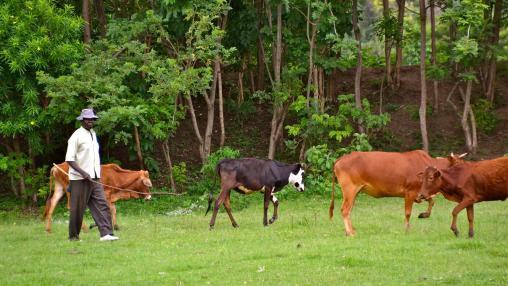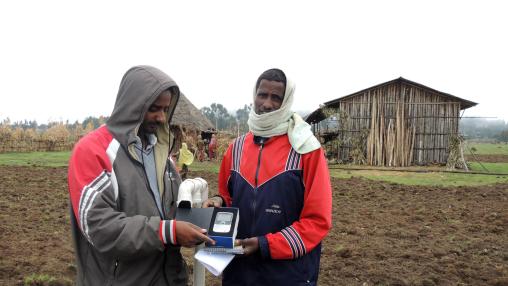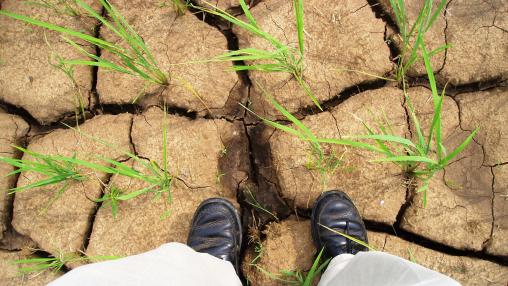
Rainy Season Begins in Kenya But Food Security Challenges Remain
The long rainy season in Kenya got off to a relatively good start in March, according to an update from FEWS Net. While the precipitation has begun to replenish water levels reduced by five consecutive seasons of below-average rainfall, however, much of the country continues to struggle with the high food prices, reduced agricultural productivity, and reduced livelihoods caused by the prolonged drought.
Groundwater: Potential and Pitfalls for Africa
Groundwater development is key to accelerating agricultural and overall economic growth, fight climate change, and generate employment in Africa. However, there is also a need to improve groundwater institutions to grow equity and environmental sustainability in groundwater use. This session discusses the African Ministers' Council on Water’s (AMCOW) groundwater program with case studies on the benefits of groundwater development as well as institutional advances in several African countries.
The importance of groundwater development for water and food security in Africa
Ukraine One Year Later: the impact of the war on agricultural markets and food security
One year after Russia invaded Ukraine, the war continues to affect global markets. World stock levels remain tight, and while prices have fallen back to pre-war levels, much uncertainty remains. This seminar will examine how the war has affected global markets, particularly wheat markets. Speakers will discuss the war’s impacts on Ukraine’s producers, wheat buyers and importers in the MENA region, and households in Egypt and Yemen. In addition, the discussion will address export restrictions and sanctions that have exacerbated price levels and volatility.
Introducing pro-WEAI complementary indicators for nutrition- sensitive agriculture and market inclusion projects
The Women’s Empowerment in Agriculture Index (WEAI) is the first-ever direct measure of women’s empowerment and inclusion in the agriculture sector. In response to demand from designers and implementors of agricultural development projects, IFPRI developed the project-level Women’s Empowerment in Agriculture Index (pro-WEAI) to track the impacts of these projects on women’s empowerment.
Taking Stock of Africa’s Agrifood Processing Sector: Key findings of the 2022 ReSAKSS Annual Trends and Outlook Report
A high-performing, resilient, and competitive agrifood processing sector can create remunerative employment opportunities, link producers to growing and lucrative urban markets, and help to ensure that consumers have access to sufficient and healthy food. Africa’s food processing sector is growing in response to growing demand for processed and high-value foods in the continent. However, processing firms, many of them small and informal enterprises, still face serious constraints.

Developing and implementing Picture-Based Advisories (PBA) for farmers in Kenya
IFPRI’s picture-based insurance (PBI) initiative, recognized as a CGIAR@50 Innovation and active since 2016, relies on participating farmers to upload smartphone pictures of their fields at intervals throughout the growing season. In the event of bad weather, pests, disease, or other problems that harm the crops, the photos are used to assess the damage and trigger insurance payouts.
Accelerated Action for Food Systems Resilience: Egypt’s plans for COP27 and the role of CGIAR
Unprecedented extreme weather events linked to climate change are contributing to the current global food and energy price crisis and severely impacting livelihoods and food and nutrition security. In this context, expectations are high for the 27th Conference of the Parties of the U.N. Framework Convention on Climate Change (COP27) taking place under the Presidency of the Arab Republic of Egypt.
2022 Africa Agriculture Trade Monitor (AATM)
Africa’s agricultural trade capacity and policy are increasingly important as global volatility in agriculture and fertilizer markets is increasing risks for many importing and exporting countries. The 2022 edition of the Africa Agriculture Trade Monitor 2022 (AATM), a flagship of IFPRI and AKADEMIYA2063, analyzes short- and long-term trends and drivers of African agricultural trade flows, including regional policies and the role of global markets.
Global Food Policy Report - Malawi Discussion of IFPRI’s 2022 Global Food Policy Report: Climate Change and Food Systems
The 2022 Global Food Policy Report, IFPRI’s flagship report, highlights the urgency of accelerating innovation, reforming policies, resetting market incentives, and increasing financing for sustainable food systems transformation. It sets forth a broad range of policy options for accelerated action by policymakers as well as international forums for policy and investment decision-making.

IFPRI Global Food Policy Report 2022: Accelerating food systems transformation to combat climate change
In 2021, the United Nations Intergovernmental Panel on Climate Change sounded the alarm on a looming crisis: Climate change is generating a “code red for humanity” that requires urgent action. Food systems are deeply entwined with this crisis. In many regions, especially in the developing world, climate change has already started to reduce agricultural productivity and disrupt supply chains, putting pressure on livelihoods and threatening to significantly increase hunger and malnutrition, making adaptation efforts crucially important.